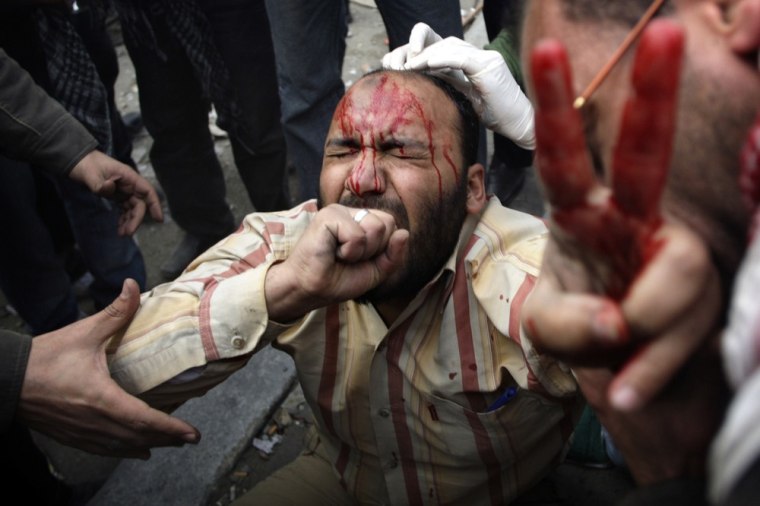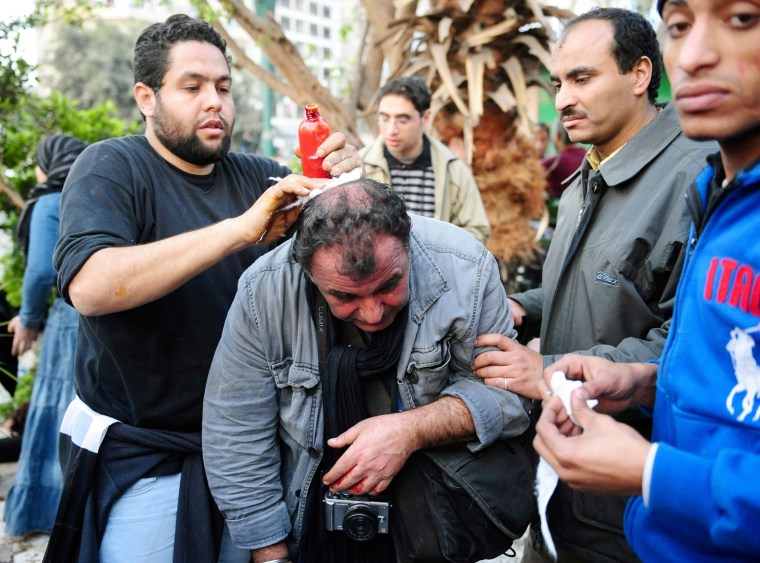The United States and Britain condemned the intimidation of reporters covering the protests against President Hosni Mubarak Thursday and said the Egyptian government must not target journalists.
Reporters working for the New York Times and the Washington Post were detained Wednesday and Thursday and freed within hours, their newspapers said. Three detained Al Jazeera journalists were also released, according to the Qatar based network.
Other media said their journalists had been beaten or stabbed in the violence that erupted in central Cairo between anti-government protesters and Mubarak supporters attempting to contain an uprising.
The Committee to Protect Journalists, a New York based press watchdog, said the attacks were a deliberate effort by the government to censor the press coverage by using mobs to intimidate reporters.
"The Egyptian government is employing a strategy of eliminating witnesses to their actions," according to Mohamed Abdel Dayem, the Committee to Protect Journalists' Middle East and North Africa program coordinator. "The situation is frightening, not only because our colleagues are suffering abuse but because when the press is kept from reporting, we lose an independent source of crucial information."
The committee has called on the Egyptian military to provide protection for journalists. The Arabic-language satellite channel Al-Arabiya also pleaded on an urgent news scroll for army personnel to guard its offices and staff.
White House weighs in
"Any journalist that has been detained should be released immediately," said White House spokesman Robert Gibbs, who reiterated the U.S. government position that the time for political transition in Egypt was now.
Gibbs said acts to intimidate the media were "completely and totally unacceptable."
"There is a concerted campaign to intimidate international journalists in Cairo and interfere with their reporting. We condemn such actions," State Department spokesman P.J. Crowley said in a statement. U.S. diplomats pressed Egypt's government to help stop the violence against journalists, he said later.
Crowley said that the U.S. had traced the attacks on protesters to "elements close to the government or the ruling party," but stopped short of blaming the attacks specifically on Mubarak, NBC News reported.
"I don't know that we have a sense of how far up the chain it went," Crowley told NBC News.
Crowley could not confirm reports that officials from the Egyptian Ministry of Interior may be behind some of the violence, saying only that "we have raised that information directly with the Egyptian government."
At least six people were killed and 800 wounded after gunmen and stick-wielding Mubarak supporters attacked demonstrators camped out for a 10th day on Cairo's Tahrir Square to demand Mubarak end his 30-year rule.
Britain also criticized Egyptian government interference with the Internet and mobile networks.
"The abuse of Internet and mobile networks and, in particular, today's increased intimidation and harassment of journalists are unacceptable and disturbing," British Foreign Secretary William Hague said in a statement.
One Belgium correspondent provided chilling details of his violent arrest, saying he was labeled a spy for Mohamed ElBaradei, Egypt's prominent opposition figure. Others reported having their clothes ripped off and passports confiscated.
Crackdown
Mubarak's government has accused media outlets of being sympathetic to protesters who want the president to quit now rather than complete his term as he has pledged.
Belgian journalist Maurice Sarfatti, who works for Brussels-based Le Soir, was among those roughed up, CPJ reported. "Sarfatti sent the following to Le Soir from his mobile phone: 'It was violent. I received a stream of blows to the face. They claimed that I was pro-Baradei. Then I was taken to a military barracks on the outskirts of town. ... I am under the care of 2 soldiers with Kalashnikov rifles and bayonets. They say I'll be taken to the secret services. They accuse me of being a spy'," according to CPJ reports.
According to pan-Arab cable network Al-Jazeera, . Whenever they see cameras and other audio or visual equipment, they radio in the details to police who then raid the journalists' rooms and bureaus.
The government has also put pressure on hotels not to give rooms to foreign journalists, according to Al-Jazeera.

"A few bloggers are saying that one particular report about body counts at a morgue precipitated the closure" of Al-Jazeera bureaus, CPJ's Dayem posted in his blog.
Government spokesman Magdy Rady said Wednesday that the assertion of state involvement in street clashes and attacks on reporters was a "fiction," and that the government welcomed objective coverage.
"It would help our purpose to have it as transparent as possible. We need your help," Rady said in an interview with The Associated Press. However, he said some media were not impartial and were "taking sides against Egypt."
Developments
A round-up of violence against journalists include:
- The arrests of Washington Post's bureau chief, Leila Fadel, and Linda Davidson, a photographer. Fadel and Davidson have since been released,
- Detention of Lara Logan of CBS News with her crew by police outside Cairo's Israeli embassy, according to TIME Magazine.
Angry men carjacked an ABC News crew and threatened to behead the journalists, but the crew managed to talk its way free, the network said.
- The Toronto Globe and Mail's journalist Sonia Verma said the military had "commandeered us and our car" in Cairo. "It is believed that Globe reporter Patrick Martin was travelling with Ms. Verma, along with a driver," the Toronto site reported.
- CNN's Anderson Cooper reported he, a producer and camera operator were set upon by people who began punching them and trying to break their camera in Cairo on Wednesday. Another CNN reporter, Hala Gorani, said she was shoved against a fence when demonstrators rode in on horses and camels, and feared she was going to get trampled. "This is incredibly fast-moving," Cooper said. "I've been in mobs before and I've been in riots, but I've never had it turn so quickly."
- Numerous assaults on journalists working for AP, CBS, the BBC, Danish TV2 News, Swiss television and Belgium's Le Soir newspaper.
- Abduction of reporter for Turkey's Fox TV, his Egyptian cameraman and their driver by men with knives while filming protests Wednesday. They were later rescued, a Turkish news agency reported.
- A correspondent and a cameraman working for Russia's Zvezda TV channel were detained by men in plainclothes and held overnight Tuesday, Anastasiya Popova of Vesti state television and radio said on air from Cairo.
The Greek daily newspaper Kathimerini said its correspondent in Cairo was hospitalized with a stab wound to the leg after being attacked by pro-Mubarak demonstrators in central Tahrir Square. He has been released. The injured journalist, Petros Papaconstantinou, said on Kathimerini's website that: "I was spotted by Mubarak supporters. They ... beat me with batons on the head and stabbed me lightly in the leg. Some soldiers intervened, but Mubarak's supporters took everything I had on me in front of the soldiers."
Turkey's state broadcaster TRT, said its Egypt correspondent, Metin Turan, was beaten by a group of around 15 pro-Mubarak demonstrators with batons and lost a tooth in the attack. His camera, money and cell phone were stolen.
